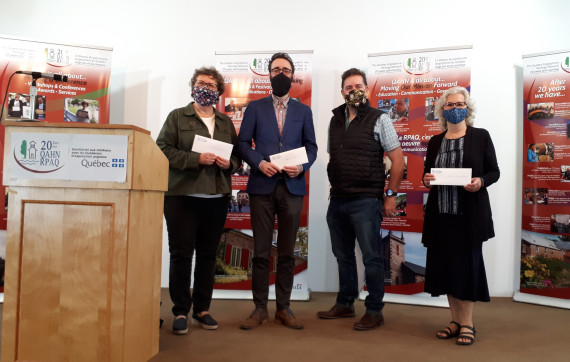
The Quebec Anglophone Heritage Network (QAHN) has partnered with nine community groups from around the province to preserve and share local historical knowledge, with special emphasis on Quebec’s English-speaking history.
Belonging and Identity in English-speaking Quebec, a QAHN project funded by Quebec's SRQEA, will support the development of museum and heritage-learning activities in several Quebec regions over the next six months.
“We are really happy to be working with our members to on such a range of interesting history projects,” said Matthew Farfan, QAHN’s executive director, following the announcement of the participating communities. Financial contributions to local history societies and other cultural groups totalling more than $44,000 will be used to highlight historic contributions of Quebec Anglophones in the Eastern Townships, Montérégie and Lanaudière regions, as well as on the Gaspé Peninsula and Magdalen Islands.
Volunteer-run history societies and small museums were hit hard by Covid-related public health restrictions during the summer of 2020, with most reporting disruptions in their seasonal programming and a sharp decline in visitor revenue. The Belonging and Identity initiative aims to help heritage groups continue to engage and inform Quebecers about local history and culture during the ongoing pandemic by supporting activities that can lessen the impact of social isolation among community members.
Richmond County Historical Society is leading efforts to publicly celebrate the Town of Richmond’s diverse cultural heritage, including its Irish and Dutch connections, by commissioning an outdoor mural, one of four history projects in the Eastern Townships.
Other projects in the Townships include: a series of online presentations and panel discussions on Missisquoi County history, organized by the Missisquoi Museum; self-guided audio tours of Stanstead and Rock Island, presented by the Colby-Curtis Museum in a mobile phone application; and a bilingual photo exhibit focused on the early settlement of Orford Township, curated by the Société d’histoire du Canton d’Orford.
Members of the heritage network, which was formed 20 years ago, play a vital role in local historical education and heritage preservation in dozens of Quebec towns and regions. Whether they maintain archives and collections, operate museums and cultural venues, or organize special exhibitions, local heritage institutions strive to bring people from all backgrounds together around a shared interest in the past.
In New Carlisle on the Gaspé Coast, the Kempffer Cultural and Interpretation Centre will use Belonging project funding to erect bilingual outdoor interpretation panels that tell about the legacy of two remarkable Gaspesians: Frederick Ludwig Kempffer, a German soldier in the pay of the British during the American revolution who settled on the Bay of Chaleurs in 1786; and Dutch-born surveyor William Vondenvelden, whose maps of the southern Gaspé influenced the pattern of colonial settlement across much of the region.
Hemmingford Archives will develop a series of travelling displays that tell about key heritage sites in the Hemmingford area and the history of the region’s celebrated apple orchards.
The English Community Organization of the Lanaudière, for its part, is producing of a video documentary that tells the story of the Mascouche Seigneury, a unique heritage property with fascinating ties to Quebec’s historic French and English colonial periods.
In the Outaouais, a local history group, Cantley 1889, is taking steps to protect an early pioneer burial ground in the Gatineau River valley. The group will use the Belonging funding to commemorate the Blackburn Cemetery with a plaque and to organize activities to raise awareness among local residents.
The Belonging partnership will also enable the Council for English speaking Magdalen Islanders (CAMI) to establish a searchable register of historic artifacts currently in its possession. The project is part of ongoing efforts to modernize heritage interpretation sites at Entry Island and Old Harry that tell about the history of local anglophone communities In the Gulf of St. Lawrence.
QAHN gratefully acknowledges the support of the SRQEA.
